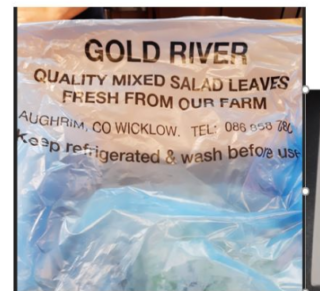Officials in Ireland are investigating an outbreak of cryptosporidium linked to a salad that has affected more than 40 people.
The Health Service Executive’s (HSE) Department of Public Health East was notified of an outbreak of cryptosporidiosis in the Dublin and Wicklow area. To date, 42 cases have been notified; with the onset of symptoms occurring over a 14 day period from July 15.
A food alert was issued by the Food Safety Authority of Ireland (FSAI) and certain batches of mixed salad leaves were withdrawn.
Product recall
The FSAI was notified by the HSE of an outbreak of cryptosporidiosis. An outbreak control team is in place and the investigation is ongoing. Many lines of inquiry are being followed up to identify and control the source of the outbreak, according to the agency.
 In early August, all batches and dates of Gold River Quality Mixed Salad Leaves (Seasonal Salad Box) 1 kilogram were withdrawn from sale due to the possible presence of Cryptosporidium. Caterers were instructed not to use the implicated batches from Gold River Farm in County Wicklow.
In early August, all batches and dates of Gold River Quality Mixed Salad Leaves (Seasonal Salad Box) 1 kilogram were withdrawn from sale due to the possible presence of Cryptosporidium. Caterers were instructed not to use the implicated batches from Gold River Farm in County Wicklow.
Most of those ill live in the South Dublin and North Wicklow area. An alert was issued to general practitioners, emergency departments and microbiologists, to increase awareness and recommend testing for cryptosporidium in patients with gastrointestinal symptoms, according to HSE.
The Department of Public Health HSE East is continuing to investigate the incident with environmental health colleagues, the Health Protection Surveillance Center, FSAI, and the Department of Agriculture.
About cryptosporidium
As cryptosporidium infection is usually waterborne or via food from contaminated water, it is recommended that the public and those involved in food preparation always follow correct hand and food hygiene procedures. There were 629 cryptosporidium cases in Ireland in 2018.
Cryptosporidium is a parasite that causes the diarrheal disease cryptosporidiosis. Symptoms generally begin two to 10 days after becoming infected. The most common symptom is watery diarrhea but other signs include stomach cramps or pain, dehydration, nausea, vomiting, fever, and weight loss.
They usually last about one to two weeks in those with healthy immune systems. Occasionally, people may experience a recurrence after a brief period of recovery before the illness ends. Symptoms can come and go for up to 30 days. For people with weakened immune systems, they can be severe and lead to life-threatening illness.
Meanwhile, an outbreak of Campylobacter with 11 patients has also been reported in the Dublin, Kildare and Wicklow area.
The onset of disease for the first case was July 4 and the outbreak was identified on July 13. Six are lab-confirmed infections. Authorities reported the incident as foodborne as the food item linked to the outbreak was chicken and cross-contamination was a contributory factor.
Source: Food Safety News